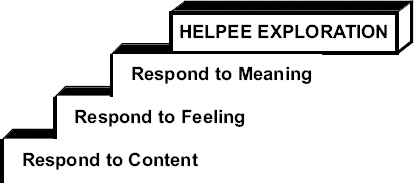5.
RESPONDING—FACILITATING EXPLORING
Yes, our cultural conditioning trained us to avoid relating. And it was wrong! Wrong because the so-called “competitive ethic” no longer works—and never was an ethic! Wrong because there is no such a thing as independence—never was, as any recently laid-off workers will testify! Wrong because things change! We were sold a lie in the 20th century. It said, “Be independent and competitive people and the system will reward you.” We have found out otherwise. By not relating, we have not been related to. The system has rewarded us in kind by not relating to us.
NON-RELATING ![]() NON-RELATIONAL
NON-RELATIONAL
In fact, the course of civilization lies straight ahead of us. We are preparing for a very complex world, a world of spiraling changes. This brave, new world brings with it a whole new set of requirements. Primary among these requirements is the ethic of interdependency. We will either live together or fall apart. We can only live together by relating, by cooperating and collaborating, by integrating. The theme of the 20th century was “Compete or die!” The theme of the 21st century is “Relate or die!”
RELATING ![]() RELATIONAL
RELATIONAL
The function of relating is interdependence. Humans were always interdependently related to each other and their worlds. It was only “humankind”—a kind of human—that conceived of itself in independent terms. Interdependence means that we are each dependent upon the other, and all dependent upon this “fragile spacecraft” that we call Earth. It means relating—to merge with one another and the phenomena we are studying. It means becoming one with that phenomena and helping it to actualize its growth potential. And, in so doing, to actualize ours!
RELATING ![]() INTERDEPENDENCE
INTERDEPENDENCE
What interdependence does not mean is consensus-building or response sharing. Interdependence means becoming part of our worlds—our part, to be sure, but nevertheless part of something larger than ourselves. In the world of interdependence, everything matters. Everything that any one element does potentially relates to everything else in the world. Everything! It may be people. It may be data. It may be things. All of these relate within themselves as well as between and among themselves. That is how we integrate ourselves and our worlds. But we do so only if these things matter to us. Only if we want to help! Only if we have the skills to relate!
INTERDEPENDENCE ![]() INTEGRATING
INTEGRATING
Responsive communication, or responding, facilitates the helpees’ exploration of where they are in relation to their worlds. We attend, observe and listen to the helpees so that we can respond to them. Responding emphasizes entering the helpees’ frames of reference and communicating to them what we hear and see. In other words, there are two separate sets of skills involved: discriminating accurately the dimensions of the helpees’ experiences and communicating accurately to the helpees the dimensions we have perceived.
Responding involves responding to content, feeling and meaning. We respond to content in order to clarify the ingredients of the helpees’ experiences. We respond to feeling in order to clarify the affect attached to the experience. We respond to meaning in order to clarify the reason for the feeling.
Responding facilitates helpee exploring. When the helper responds accurately to the helpees, then the helpees explore where they are in relation to their worlds. Responding both stimulates and reinforces helpee exploring. It lays the base for personalizing to facilitate helpee understanding.

RESPONDING FACILITATES HELPEE EXPLORING
